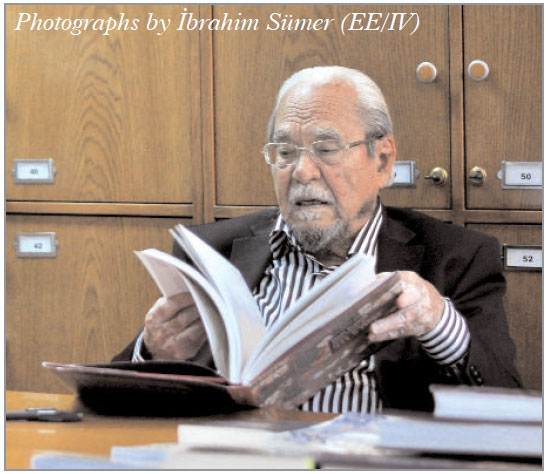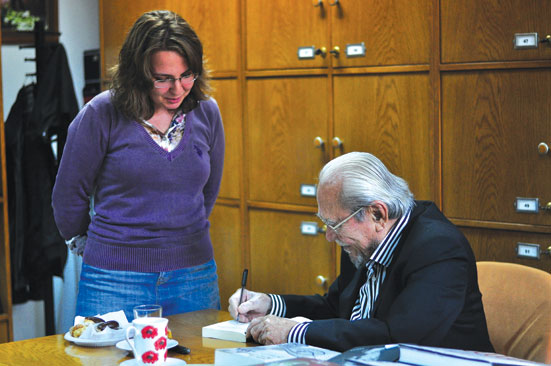"Ottoman History is World History"
BY ALP RODOPLU (HIST/V)
Prof. Dr. Halil İnalcık, founder of the Department of History and in all likelihood the single most important living scholar in the field of Ottoman history, met with students and faculty on Friday, October 7, at the Halil İnalcık Centre for Ottoman Studies (HICOS). Organized by the Bilkent History Society, the occasion for the event was the publication of Halil Hoca's new book “Rönesans Avrupası” (“Renaissance Europe”).
 The many who attended were fortunate enough to hear Prof. İnalcık speak on a variety of topics, which ranged from the current state of the HICOS to recent developments in Ottoman studies. Prof. İnalcık also talked briefly about what has shaped his scholarly work, elaborating on the direction in which he hopes Ottoman studies is heading, and also on where his new publication stands in context of his works as a whole.
The many who attended were fortunate enough to hear Prof. İnalcık speak on a variety of topics, which ranged from the current state of the HICOS to recent developments in Ottoman studies. Prof. İnalcık also talked briefly about what has shaped his scholarly work, elaborating on the direction in which he hopes Ottoman studies is heading, and also on where his new publication stands in context of his works as a whole.
The inseparability of the histories of Europe and the Ottoman Empire is a thesis that Prof. İnalcık has been putting forward for many years.Political history, as a historiographical perspective that has been dominant in the study of the Ottoman Empire and its interactions with the West, has obscured this historical actuality and also hindered efforts to attain a more complete appreciation of the complexities of the Ottoman world. At Friday's event, Halil Hoca explained that the leitmotif of “Rönesans Avrupası” is constituted in the spirit of these ideas.
Composed of his lecture notes on the "History of the Renaissance"--a course he taught between 1952 and 1972 at the Faculty of Languages, History and Geography at Ankara University--and prepared for publication with a supplemental section on the process of Turkey's identification (özdeşleşme) with Western civilization, “Rönesans Avrupası” takes the French general history series “Peuples et Civilisations” as its framework. The book incorporates the stance that one of the most significant historical episodes shaping Western civilization--that is, a period in which the seeds of modern Europe were planted--cannot be completely understood in the absence of a proper recognition of the Ottomans' place in the events of this age.
and 1972 at the Faculty of Languages, History and Geography at Ankara University--and prepared for publication with a supplemental section on the process of Turkey's identification (özdeşleşme) with Western civilization, “Rönesans Avrupası” takes the French general history series “Peuples et Civilisations” as its framework. The book incorporates the stance that one of the most significant historical episodes shaping Western civilization--that is, a period in which the seeds of modern Europe were planted--cannot be completely understood in the absence of a proper recognition of the Ottomans' place in the events of this age.
A more complete and comprehensive historical understanding of the Ottomans is thus necessary not only for the sake of Ottoman history, but also for the sake of a true world history: "Ottoman history is world history," as Halil Hoca put it. Hence, research efforts in the fields of economic, social, cultural and intellectual history are vital for both Ottoman and world history. Prof. İnalcık has been a pioneer in this path, and the meeting on Friday showed that there are and will be many more to follow in his footsteps, who continue to be inspired by his example--the humble author of these words being only one among them.